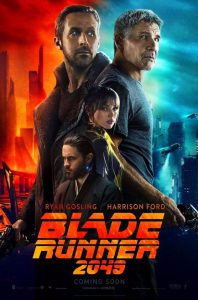Blade Runner 2049 (2017) – Film review

The original Blade Runner – released in 1982 – was a dark, rainswept view of a dystopian future dressed up as a film noir detective story with a unique Vangelis sound track that inspired a generation of dark science fiction films.
A flop on release, it gained a cult following on video afterwards and there was enough interest to get two different versions released cinematically in subsequent decades – The Director’s Cut and The Final Cut – all directed by Ridley Scott.
All three versions are a film student’s dream, being officially released cuts of the film and each subsequent cut is responsible for cleaning up loose threads, but also reintroducing ambiguity into a film which already had legendary status amongst genre fans.
The themes explored in the original Blade Runner are so compelling that we have seen modern popular adaptations of artificial intelligence in such eclectic modern culture in films and TV shows such as AI (2001), Battlestar Galactica (2003-2009), Prometheus (2012), Her (2013), Humans (2015-), Westworld (2016-), and Alien: Covenant (2017).
Blade Runner 2049 is a follow-up to the densely plotted original helmed by acclaimed director Denis Villeneuve who directed 2016s Arrival, written by one of the original Blade Runner screenwriters, Hampton Fancher, with deft cinematography by Roger Deakins. Ridley Scott also gets a producer credit.
As suggested by the title Blade Runner 2049 is set 30 years after the original dystopian Blade Runner and nothing like the bright lights and primary colours seen in the Star Wars trilogy that set the standard look for modern science fiction cinema.
Gone is the constant drizzle, replaced by a different kind of environmental catastrophe in which snow and smog hangs over the city of Los Angeles and the devastated remains of Las Vegas.
New model highly regulated androids – dubbed replicants – are allowed on Earth as slave labour following a catastrophe known as “Blackout” in the past but some older model replicants from prior to Blackout still exist, meaning that special Blade Runner units are still employed by police to hunt down and ’retire’ them.
Officer K, played by Ryan Gosling, is a Blade Runner who uncovers a long buried secret which threatens to plunge what’s left of society into chaos and starts a quest to find Rick Deckard, played by Harrison Ford, who has been missing for 30 years along with pre-Blackout Nexus prototype android Rachel.
AI themes for Blade Runner as Ana de Armas delivers a great performance
Familiar themes of slavery, identity, memory and the meaning of humanity are explored during the film and while there is a main plot involving the search for Deckard there are interesting sub-plots featuring K and his girlfriend Joi (played by Ana de Armas), while Robin Wright plays Lt. Joshi, K’s LAPD boss, also shares some powerful scenes with K.
In fact most of the supporting characters add to the richness of the plot, it’s just a pity that some of the iconic street scenes are lost or banished to the short films that support the main feature but there’s still plenty of detail to be seen.
Some of the original Blade Runner visual signature – the advertising-soaked neon city scapes – has been seen before this year in the otherwise ordinary Ghost in the Shell (2017) but ace cinematographer Roger Deakins comes up with more lush visuals to illustrate Los Angeles in 2049 meaning there’s a lot of beautifully composed shots in the film.
Despite a slower pacing showing off some rich visuals this film lacks the cultural impact of Ridley Scott’s original Blade Runner vision which viewers may benefit from watching alongside the three short prelude films which explain some of the backstory which sets up the events of 2049.
The 1982 original is rightly seen as science fiction cinema at its best with some of the most memorable lines in cinema history and while 2049’s long running time allows the sequel plenty of space to allow its ideas to breathe – perhaps too much space – this may ironically work against it when trying to get a younger audience engaged.
For what it’s worth in my opinion the sequel easily held my attention and never felt long but in editing terms this is a throwback to films from an earlier generation and the difference between 2049 and ‘modern’ films is easy to see.
Blade Runner 2049 (15; strong violence, language, sexualised nudity 163 minutes)
Director: Denis Villeneuve
Cast Includes: Ryan Gosling, Harrison Ford, Ana de Armas, Jared Leto, Lennie James, Robin Wright, Dave Bautista, Edward James Olmos, Barkhad Abdi, Hiam Abbass
Summary: BLADE RUNNER 2049 is a science fiction sequel in which a Los Angeles detective investigates a mystery.
Rating: **** (Not as groundbreaking as the original but it looks great and still gives you plenty to think about)